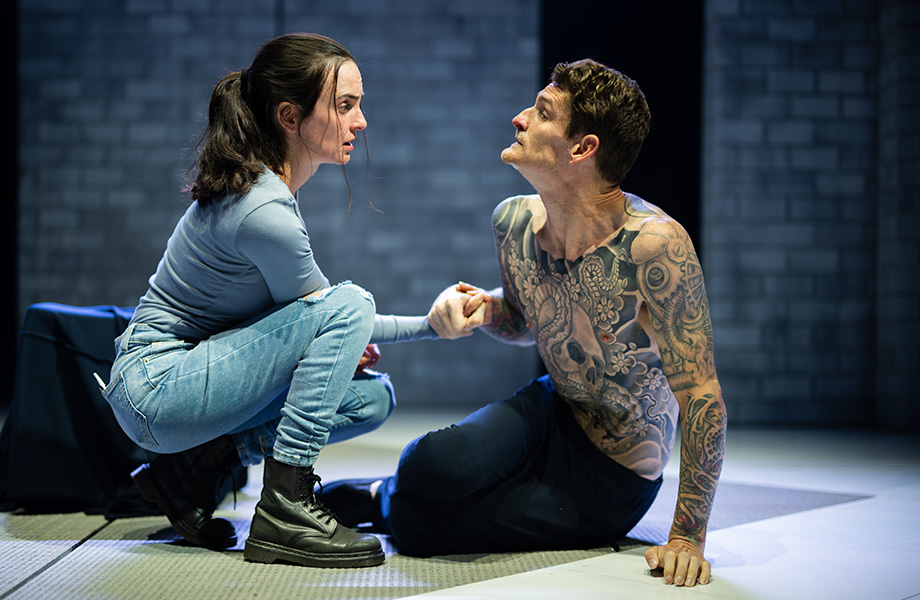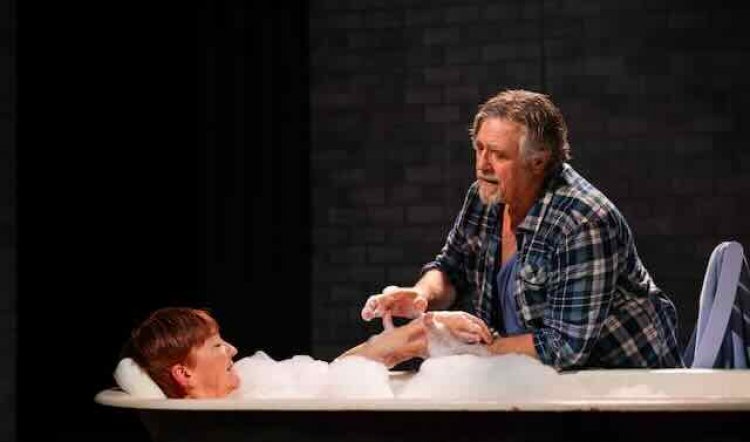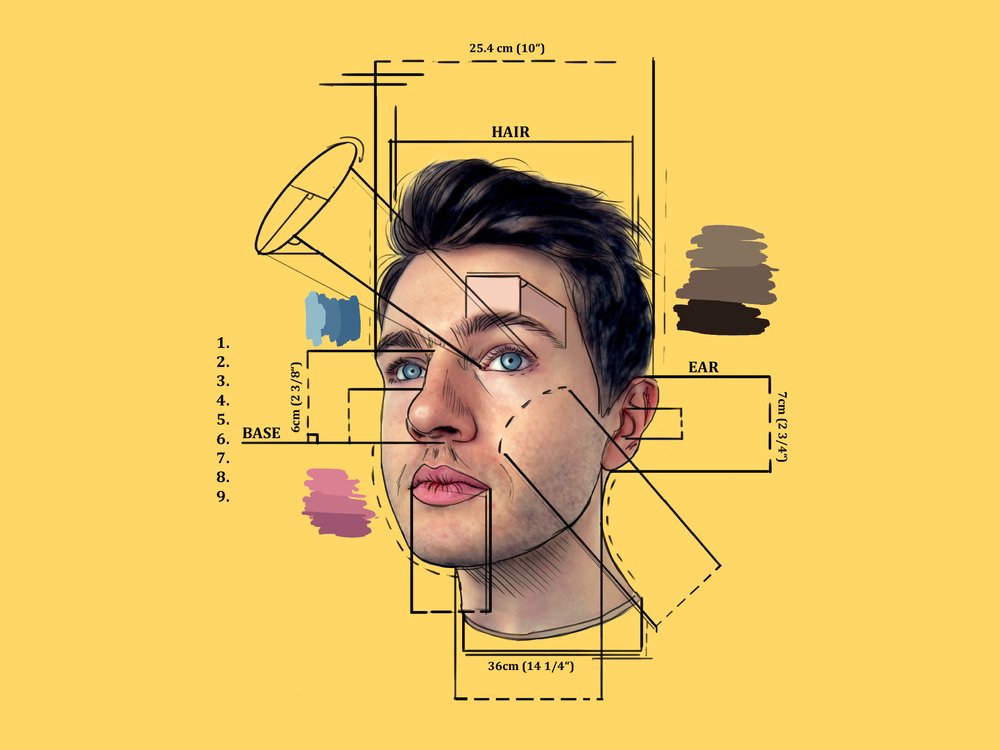Written by Martyna Majok
A raw and nuanced exploration of love and connection, loneliness and isolation that represents disability with refreshing authenticity
Reviewed by Claira Prider
Wharf 1 Theatre, Sydney Theatre Company
Until 18th August, 2024
Tickets: Cost of Living – Sydney Theatre Company
‘The cost of living’ makes me think of price gouging supermarket duopolies, renting, petrol, and my ever-increasing HECS debt, but Martyna Majok’s Pulitzer Prize-winning play Cost of Living explores the emotional and social cost of being visibly disabled in a world built for able-bodied people. Described as an examination of disability, privilege and the need for human connection, Cost of Living tells the stories’ of two mismatched pairs: a former trucker and his recently paralysed ex-wife, and an arrogant young man with cerebral palsy and his new caregiver.
Carer-turned-playwright, Martyna Majok is known for her well informed, anti-sentimentalist writing about marginalised or underrepresented groups and minorities. Cost of Living presents four deeply informed, multi-faceted characters without fetishizing or presenting disability as tragic and heroic while also challenging our idea of what disability can look like. The writing explores the delicate balance between need and care, and challenges us to think about our need to care for, and to be cared for, regardless of the body we’re in.

Images by Morgan Roberts
The work opens to a sparse setting, with a pale-coloured floor and door-sized grey brick panels that slide horizontally and diagonally across the stage. As the sliding panels create different shapes and spaces, flashes of light introduce us to the four characters moving through the streets of current day New Jersey. Guy Webster’s sound design and composition combines soundscapes of rainy and windy streets with honking taxis and revving motorbikes as well as harmonious strings and acapella voices, and a bit of Debussy. Michael Scott-Mitchell’s set design allows for swift scene changes, including a bathroom with a functioning shower. The dull, depressing looking space leaves a lot to the imagination, as Ani later references “imagination is all I have”.
Ani is irritable, short tempered and feeling completely isolated after becoming quadriplegic later in life from a car accident. The writing gives her permission to present a deeply grief-stricken anger, rarely seen but so often felt by disabled folk. Her now-separated husband Eddie tries to brighten the mood with (well-meaning but relatively useless) suggestions such as repainting the walls using colour therapy, or how to get the most benefit from music therapy which only make her feel more misunderstood. “I’m pissed and I’m sad and that’s fine. There is no recovery. So stop.” The rawness of Kate Hood’s performance as Ani is disarming; as much as the character pushes away her loved ones, Hood draws us into her world; her performance is consistently magnetic.
Desperate to be let into his wife’s life to care for her, Philip Quast’s portrayal of Eddie brims with complexity and warmth. Their love is awkward, Eddie often articulates his feelings and vulnerabilities poorly and there is palpable discomfort between them despite decades of marriage which makes for an exhilarating and gripping chemistry to witness.
Co-Directed by and playing the role of John is Dan Daw. A wealthy, Harvard educated man with cerebral palsy who’s undertaking a PHD, John is able to live alone but needs to hire a carer to assist him with daily tasks such as showering and dressing. As an artist, Daw’s work challenges stereotyped expectations and assumptions about his disability, and his portrayal of John is no different. Daw’s characterisation crescendos from unapologetically blunt and egotistical, to breathtakingly tender, particularly when opening up to Jess about his yearning for connection and conversation.
Zoe de Plevitz plays the role of Jess, interviewing and becoming employed as John’s carer. Despite receiving a Princeton education, she finds herself tending bars and taking on extra jobs and still struggling to stay afloat. De Plevit’s thoughtful characterisation beautifully portrays Jess’ desperate need for connection and conversation while trying to protect herself as she struggles to let anyone in.
So often inclusive actions feel performative and box ticking, but I found this production to successfully deliver an authentic portrayal of the cost of being disabled in today’s western world.

Images by Morgan Roberts
Co-Director Priscilla Jackman notes ‘we celebrate the different perspective we bring from our different lived experience, from our different artistic practice, from our differing bodies of creative work.’ This production between Queensland Theatre and Sydney Theatre Company is the first mainstage production in the country to have equal ratio of disabled and non-disabled artists, on stage as well as working within the creative team.
The success of the play is testament to the importance of consulting and including people with lived experience both in and around disabled bodies.
Touching on themes of loneliness, vulnerability and the price of basic care Cost of Living presents four deeply informed, multi-dimensional characters who turn the notion of disability as otherness on its’ head and highlights the importance of providing comprehensive disability support by following a social model rather than just a medical disability support model. Afterall, the universal need for all of the characters, is human connection.
ACCESSIBLE PERFORMANCES:
An audio description performance will take place on Tuesday 6 August at 6:30pm.
An AUSLAN-Interpreted performance will run on Thursday 8 August at 7:30pm.
A relaxed performance will run on Sunday 11 August at 5:00pm.
Captioned performances will run on Tuesday 13 August at 6:30pm and Saturday 17 August at 1:30pm.
CAST AND CREATIVES
Co-Directors Priscilla Jackman and Dan Daw
Designer Michael Scott-Mitchell
Lighting Designer John Rayment
Composer & Sound Designer Guy Webster
Movement & Intimacy Coach NJ Price
Dialect Coach Gabrielle Rogers
Cast Dan Daw, Kate Hood, Zoe de Plevitz, Philip Quast







